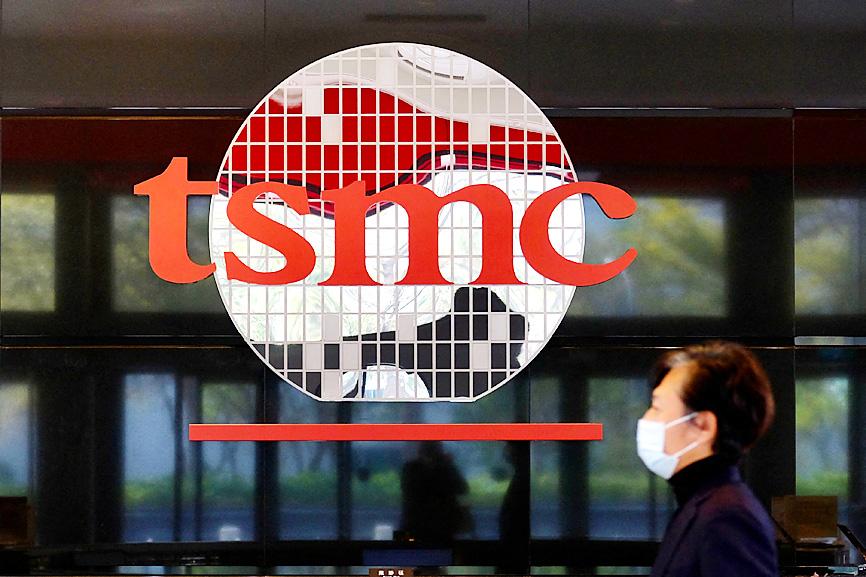Taiwan Semiconductor Manufacturing Co (TSMC, 台積電) is expected to post a 25 percent year-on-year increase in sales in the first quarter of this year to US$12.91 billion, up from US$10.31 billion a year earlier, as its production is at full capacity, market advisory firm TrendForce Corp said in a note last week.
The increase would help TSMC cement its leadership in the industry by taking a 56 percent market share in the global pure wafer foundry business, TrendForce said.
Its forecast was in line with TSMC’s estimate in January, which pointed to a range of US$12.7 billion to US$13 billion for the first quarter.

Photo: Sam Yeh, AFP
TSMC is to benefit from its efforts to develop a 5-nanometer production process, which began mass production in the second quarter of last year, TrendForce said.
The process is expected to account for about 20 percent of TSMC’s total revenue in the first quarter, it added.
TSMC is expected to continue to see solid demand for its 7-nanometer technology from major customers, such as US-based Advanced Micro Devices Inc, Nvidia Corp and Qualcomm Inc, as well as Taiwan’s MediaTek Inc (聯發科), TrendForce said.
The 7-nanometer process is expected to make up more than 30 percent of TSMC’s total sales in the first quarter, the advisory firm said.
TSMC is expected to receive an additional boost from strong global demand for 5G applications, high-performance computing devices and automotive electronics, it added.
Smaller local rival United Microelectronics Corp (UMC, 聯電) is expected to see its sales for the first quarter rise 14 percent from a year earlier to US$1.60 billion, giving it a 7 percent market share and placing it third globally, TrendForce said.
UMC is expected to receive large orders in a wide range of products, such as driver ICs, power management ICs, radio-frequency applications and the Internet of Things, in the first quarter, it said.
South Korea’s Samsung Electronics Co is expected to follow TSMC in sales, generating US$4.05 billion, up 11 percent from a year earlier, to take an 18 percent share in the global market, TrendForce said.
US-based GlobalFoundries Inc is expected to take the fourth position, generating US$1.47 billion in sales in the first quarter, followed by China’s Semiconductor Manufacturing International Corp (中芯國際, US$1.06 billion), Israel’s Tower Semiconductor Ltd (US$345 million), Taiwan’s Powerchip Semiconductor Manufacturing Corp (力積電, US$340 million) and Vanguard International Semiconductor Corp (世界先進, US$327 million), China’s Hua Hong Semiconductor Ltd (華虹半導體, US$288 million) and South Korea’s DB HiTek Co (US$197 million).

Sweeping policy changes under US Secretary of Health and Human Services Robert F. Kennedy Jr are having a chilling effect on vaccine makers as anti-vaccine rhetoric has turned into concrete changes in inoculation schedules and recommendations, investors and executives said. The administration of US President Donald Trump has in the past year upended vaccine recommendations, with the country last month ending its longstanding guidance that all children receive inoculations against flu, hepatitis A and other diseases. The unprecedented changes have led to diminished vaccine usage, hurt the investment case for some biotechs, and created a drag that would likely dent revenues and

Macronix International Co (旺宏), the world’s biggest NOR flash memory supplier, yesterday said it would spend NT$22 billion (US$699.1 million) on capacity expansion this year to increase its production of mid-to-low-density memory chips as the world’s major memorychip suppliers are phasing out the market. The company said its planned capital expenditures are about 11 times higher than the NT$1.8 billion it spent on new facilities and equipment last year. A majority of this year’s outlay would be allocated to step up capacity of multi-level cell (MLC) NAND flash memory chips, which are used in embedded multimedia cards (eMMC), a managed

CULPRITS: Factors that affected the slip included falling global crude oil prices, wait-and-see consumer attitudes due to US tariffs and a different Lunar New Year holiday schedule Taiwan’s retail sales ended a nine-year growth streak last year, slipping 0.2 percent from a year earlier as uncertainty over US tariff policies affected demand for durable goods, data released on Friday by the Ministry of Economic Affairs showed. Last year’s retail sales totaled NT$4.84 trillion (US$153.27 billion), down about NT$9.5 billion, or 0.2 percent, from 2024. Despite the decline, the figure was still the second-highest annual sales total on record. Ministry statistics department deputy head Chen Yu-fang (陳玉芳) said sales of cars, motorcycles and related products, which accounted for 17.4 percent of total retail rales last year, fell NT$68.1 billion, or

In the wake of strong global demand for AI applications, Taiwan’s export-oriented economy accelerated with the composite index of economic indicators flashing the first “red” light in December for one year, indicating the economy is in booming mode, the National Development Council (NDC) said yesterday. Moreover, the index of leading indicators, which gauges the potential state of the economy over the next six months, also moved higher in December amid growing optimism over the outlook, the NDC said. In December, the index of economic indicators rose one point from a month earlier to 38, at the lower end of the “red” light.